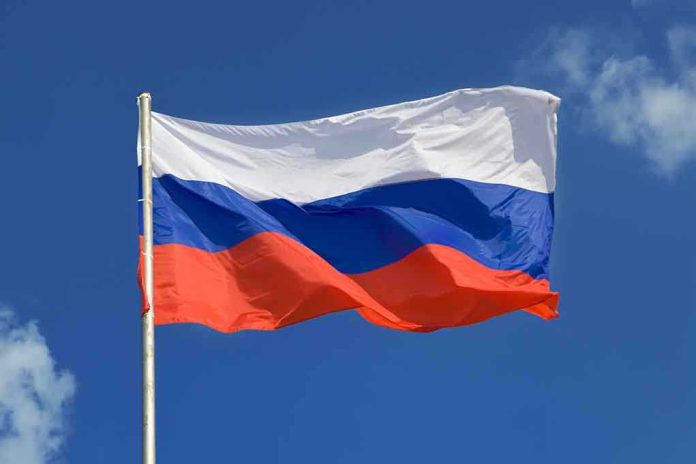
Congress is sharpening its knives for Russia with a sanctions bill that’s supposed to teach Putin a lesson, but the only real lesson seems to be how D.C. manages to turn tough talk and bureaucracy into a game of who gets the bigger slice of power—and Americans are once again left watching the circus.
At a Glance
- Congress is pushing a new sanctions package against Russia, intensifying penalties over the Ukraine war.
- Speaker Mike Johnson claims there’s a “big appetite” for tough action, but the real appetite is for more congressional control over foreign policy.
- President Trump wants sanctions but insists on the power to waive them anytime it suits American interests—or his negotiating style.
- The bill’s fate hinges on another classic D.C. tug-of-war over who calls the shots: Congress or the White House.
Congress Zeroes In on Russia—But Who’s the Real Target?
Speaker Mike Johnson is out front again, declaring that the House is hungry for stronger Russia sanctions. The “Sanctioning Russia Act of 2025” is barreling through Congress, gathering support from both sides of the aisle. The urgency? Russia’s latest attacks on Ukraine and Moscow’s continued refusal to come to the table. Lawmakers are promising to hit the Kremlin where it hurts, targeting energy exports and big banks. But this isn’t just about punishing Putin; it’s about Congress showing it still matters, especially after years of being sidelined by executive orders and bureaucratic games.
Senate Majority Leader John Thune wants the measure up for a vote before the August recess. Senator Lindsey Graham and Senator Richard Blumenthal are leading the charge in the Senate, and the message is clear: if Russia keeps pushing, American lawmakers will push harder. Of course, none of this would be complete without a little grandstanding, and Speaker Johnson is all too happy to provide it, declaring, “Tough sanctions are called for… Putin has shown an unwillingness to work with President Trump to bring an end to this unjust war on Ukraine, and we’ve got to talk tough and act tough.” That’s the script, but the real drama is unfolding behind the scenes.
The White House Wants Flexibility—Congress Wants the Last Word
The Trump administration is, as always, looking for “flexibility.” President Trump likes the idea of new sanctions—especially if they make him look strong—but wants the power to waive them for diplomatic reasons. In plain English: Trump wants to keep Congress from tying his hands, so he can negotiate with Putin or anyone else as he sees fit. The White House is in a tug-of-war with lawmakers who think executive waivers are just loopholes waiting to be abused. Congressional Republicans and Democrats alike are tired of seeing tough sanctions watered down by last-minute executive carve-outs and backroom deals.
The result? Weeks of negotiations over how much power the President should have to suspend or alter sanctions, and how much oversight Congress will retain. The last time this fight broke out was with the 2017 CAATSA bill, which forced the President to get congressional approval before rolling back Russia penalties. This time, Trump and his allies want more leeway, and Congress is fighting to keep its seat at the table.
What’s Really at Stake: Power, Not Just Policy
On paper, these new penalties are supposed to cripple Russia’s energy sector and financial system, forcing Putin to the negotiating table and, maybe, ending the war in Ukraine. But let’s not kid ourselves: this is as much about the balance of power in D.C. as it is about Eastern Europe. Every time Congress flexes its muscles, the White House tries to outmaneuver them, and the American taxpayer is left picking up the tab for another round of “tough” legislation that may end up toothless after negotiations are done.
Energy markets could see new volatility, businesses with Russian ties are bracing for impact, and Americans may get another lesson in government overreach—this time with global consequences. Lawmakers are patting themselves on the back for “standing up to Russia,” but the real question is whether these sanctions will change anything in Moscow, or just fuel another round of political theater at home. Experts say previous sanctions haven’t made Russia back down, and unless there’s real teeth—and real oversight—this batch won’t be any different.










